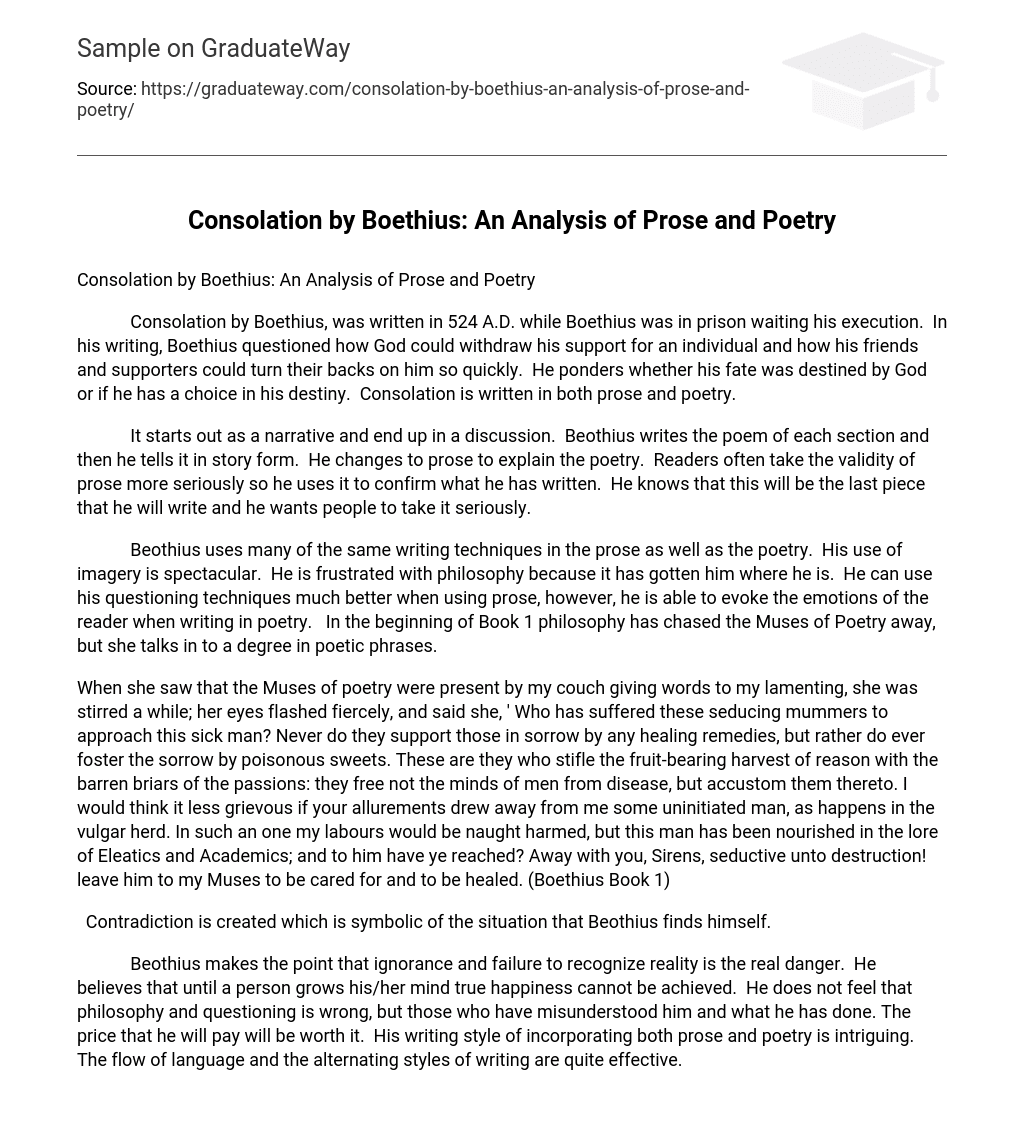Consolation by Boethius: An Analysis of Prose and Poetry
Consolation by Boethius, was written in 524 A.D. while Boethius was in prison waiting his execution. In his writing, Boethius questioned how God could withdraw his support for an individual and how his friends and supporters could turn their backs on him so quickly. He ponders whether his fate was destined by God or if he has a choice in his destiny. Consolation is written in both prose and poetry.
It starts out as a narrative and end up in a discussion. Beothius writes the poem of each section and then he tells it in story form. He changes to prose to explain the poetry. Readers often take the validity of prose more seriously so he uses it to confirm what he has written. He knows that this will be the last piece that he will write and he wants people to take it seriously.
Beothius uses many of the same writing techniques in the prose as well as the poetry. His use of imagery is spectacular. He is frustrated with philosophy because it has gotten him where he is. He can use his questioning techniques much better when using prose, however, he is able to evoke the emotions of the reader when writing in poetry. In the beginning of Book 1 philosophy has chased the Muses of Poetry away, but she talks in to a degree in poetic phrases.
When she saw that the Muses of poetry were present by my couch giving words to my lamenting, she was stirred a while; her eyes flashed fiercely, and said she, ‘ Who has suffered these seducing mummers to approach this sick man? Never do they support those in sorrow by any healing remedies, but rather do ever foster the sorrow by poisonous sweets. These are they who stifle the fruit-bearing harvest of reason with the barren briars of the passions: they free not the minds of men from disease, but accustom them thereto. I would think it less grievous if your allurements drew away from me some uninitiated man, as happens in the vulgar herd. In such an one my labours would be naught harmed, but this man has been nourished in the lore of Eleatics and Academics; and to him have ye reached? Away with you, Sirens, seductive unto destruction! leave him to my Muses to be cared for and to be healed. (Boethius Book 1)
Contradiction is created which is symbolic of the situation that Beothius finds himself.
Beothius makes the point that ignorance and failure to recognize reality is the real danger. He believes that until a person grows his/her mind true happiness cannot be achieved. He does not feel that philosophy and questioning is wrong, but those who have misunderstood him and what he has done. The price that he will pay will be worth it. His writing style of incorporating both prose and poetry is intriguing. The flow of language and the alternating styles of writing are quite effective.
Then was dark night dispelled, the shadows fled away, and my eyes received returning power as before. ‘Twas just as when the heavenly bodies are enveloped by the west wind’s rush, and the sky stands thick with watery clouds; the sun is hidden and the stars are not yet come into the sky, and night descending from above o’erspreads the earth. (Beothius, Book 1)
Is the perfect example of how his writing style brings into the picture that he is trying to create.
The Consolation is one of the best examples that the modern world has of the Middle Age. The work has stood the test of time because of the style of writing used by Beothius. The misconception that creativity and intellectual thought was dead at the time is proved wrong through this fantastic piece.
Works Cited
Beothius, Ancius. The Consolation of Philosophy. 524 A.D. New York: Penguin Books. 1999.





